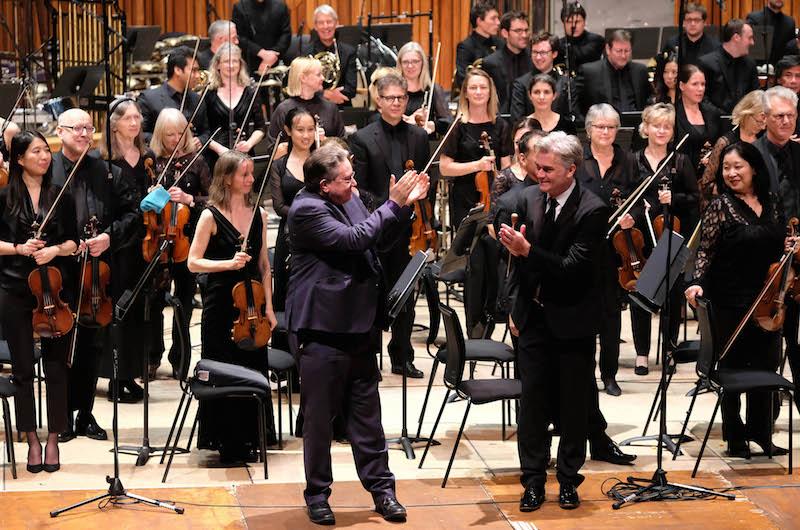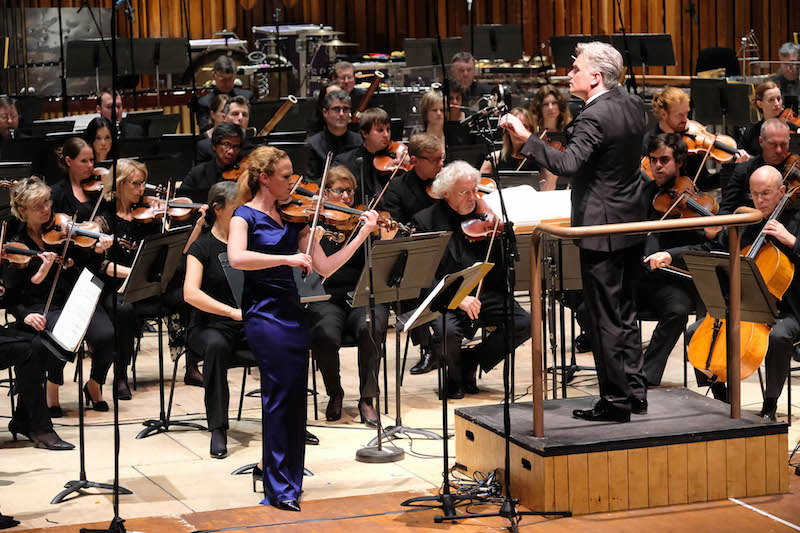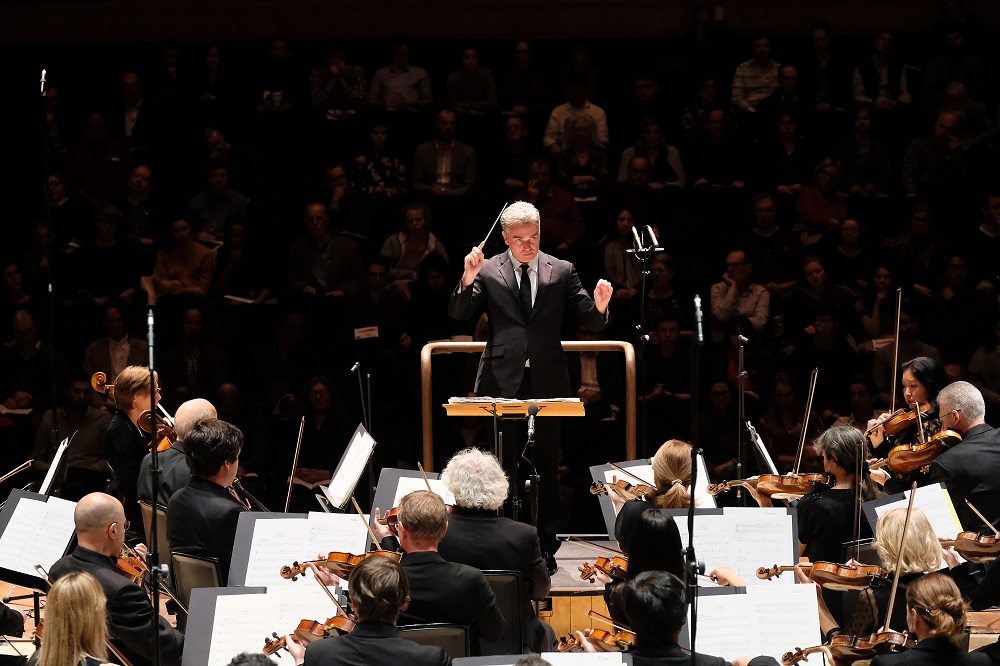Total Immersion: Julian Anderson, Barbican review - BBC ensembles showcase leading British composer | reviews, news & interviews
Total Immersion: Julian Anderson, Barbican review - BBC ensembles showcase leading British composer
Total Immersion: Julian Anderson, Barbican review - BBC ensembles showcase leading British composer
Well-sung choral music good but orchestral works even better

Julian Anderson’s 50th birthday this year was the prompt for the latest of the BBC’s Total Immersion days, devoted to the work of a single contemporary composer.
The day consisted of three concerts of which I heard two: the BBC Singers surveying Anderson’s choral output and the BBC Symphony Orchestra his orchestral works. At both concerts Julian Anderson was interviewed on stage before and in between the pieces. I like this way of connecting with the audience in concerts of new music but in this case found some of the links a little long and, although he is an eloquent broadcaster, some of Anderson’s contributions were a little awkward, until the final one when he gave voice to a passionate appreciation of the players and singers.
The BBC Singers, under Nicholas Kok, were in fine voice in the 5pm concert at St Giles Cripplegate. Anderson’s choral music is technically challenging, particularly harmonically, even in the works designed for amateurs. I was interested to hear the Four American Choruses in a chamber choir performance, having previously heard them sung by much larger forces. On balance I think they work better on a larger scale, although the BBC Singers gave a committed performance, sounding suitably bluesy in “At the Fountain”.
The riveting first movement of 'Fantasias', for brass alone, was thrillingly played by the BBCSO brass section
The highlight of the concert was Anderson’s Bell Mass of 2010, written for Westminster Abbey. It had echoes of the Anglican tradition, of an older Catholic style and also of modern classics like Stravinsky’s Mass. From the assertive opening, to the gorgeous “Amen” in the “Gloria”, a fantastic aleatoric climax to the “Sanctus” and the shaded microtonal solos of the “Benedictus” – soloists Charles Gibbs and Olivia Robinson stood out – I was carried along very enjoyably. Only the organ part seemed superfluous, interrupting the flow rather than supporting the voices.
If the choral music felt like the work of a very impressive choral composer, the BBCSO concert in the Barbican Hall made it clear that the orchestra is Julian Anderson’s true métier. Endlessly inventive in timbral and textural effects, it was also notable that there was more lyricism here than in the choral works.
This was evident from the start, Eden coming to life through Norbert Blume’s fragile viola solo, without vibrato and coloured with quarter-tones. The harmony, constructed according to the French “spectral” principles that Anderson was an early British advocate of, was delicious and enchanting. Imagin’d Corners, for orchestra with five obbligato horns, was exciting, especially in its flaring ending: Anderson is good at endings. The first half ended with the violin concerto in all but name In lieblicher Bläue. Based on a Hölderlin prose-poem, the music traced “the journey of someone’s thoughts and feelings throughout a life”. This accounted for the episodic structure, and the piece was held together by the solo violin, a role strongly characterised by Carolin Widmann (pictured above with Edward Gardner and the BBCSO). The impish first minutes give way to a long aria for violin in the second half. Widmann’s sound was radiant, and Gardner gave her room to be expansive.
The first half ended with the violin concerto in all but name In lieblicher Bläue. Based on a Hölderlin prose-poem, the music traced “the journey of someone’s thoughts and feelings throughout a life”. This accounted for the episodic structure, and the piece was held together by the solo violin, a role strongly characterised by Carolin Widmann (pictured above with Edward Gardner and the BBCSO). The impish first minutes give way to a long aria for violin in the second half. Widmann’s sound was radiant, and Gardner gave her room to be expansive.
Perhaps the danger with immersive days is that some of the composer’s standby effects become diminished by repetition. Here the de-tuned piano popped up several times, as did Anderson’s predilection for having his players move around the stage. To me this served little effect apart from worrying that Widmann would trip on her dress, or that one of the horn players would step backwards and fall off the stage. Although these might seem trivial concerns, I bet I wasn’t the only person in the audience distracted by them, and so momentarily taken away from the music.
Other things that might have seemed gimmicky in fact served a use. In In lieblicher Bläue the soloist bowed with a pencil, and in doing so found an arresting sound that was imitated around the orchestra. At its premiere the Arts Desk reviewer found the pencil business irritating and the piece underwhelming; on this occasion I thought both worked, but I did find Widmann turning her back on the audience for the last two minutes pointless.
It is a credit to the BBC that such an event as this took place. It is to the credit of the BBCSO that they can put together such a challenging programme of contemporary works in, presumably, limited rehearsal time. The understated and ultra-clear conducting of Edward Gardner (pictured above) can only have been a calming presence. And although Total Immersion days can leave you feeling like you’ve overindulged at the buffet, this one left me with a fresh appetite for Anderson's work.
rating
Share this article
The future of Arts Journalism
You can stop theartsdesk.com closing!
We urgently need financing to survive. Our fundraising drive has thus far raised £49,000 but we need to reach £100,000 or we will be forced to close. Please contribute here: https://gofund.me/c3f6033d
And if you can forward this information to anyone who might assist, we’d be grateful.

Subscribe to theartsdesk.com
Thank you for continuing to read our work on theartsdesk.com. For unlimited access to every article in its entirety, including our archive of more than 15,000 pieces, we're asking for £5 per month or £40 per year. We feel it's a very good deal, and hope you do too.
To take a subscription now simply click here.
And if you're looking for that extra gift for a friend or family member, why not treat them to a theartsdesk.com gift subscription?
more Classical music
 Solomon, OAE, Butt, QEH review - daft Biblical whitewashing with great choruses
Even a top soprano and mezzo can’t make this Handel paean wholly convincing
Solomon, OAE, Butt, QEH review - daft Biblical whitewashing with great choruses
Even a top soprano and mezzo can’t make this Handel paean wholly convincing
 Two-Piano Gala, Kings Place review - shining constellations
London Piano Festival curators and illustrious friends entertain and enlighten
Two-Piano Gala, Kings Place review - shining constellations
London Piano Festival curators and illustrious friends entertain and enlighten
 Echo Vocal Ensemble, Latto, Union Chapel review - eclectic choral programme garlanded with dance
Beautiful singing at the heart of an imaginative and stylistically varied concert
Echo Vocal Ensemble, Latto, Union Chapel review - eclectic choral programme garlanded with dance
Beautiful singing at the heart of an imaginative and stylistically varied concert
 Scott, Irish Baroque Orchestra, Whelan, RIAM, Dublin review - towards a Mozart masterpiece
Characteristic joy and enlightenment from this team, but a valveless horn brings problems
Scott, Irish Baroque Orchestra, Whelan, RIAM, Dublin review - towards a Mozart masterpiece
Characteristic joy and enlightenment from this team, but a valveless horn brings problems
 Classical CDs: Voice flutes, flugelhorns and froth
Baroque sonatas, English orchestral music and an emotionally-charged vocal recital
Classical CDs: Voice flutes, flugelhorns and froth
Baroque sonatas, English orchestral music and an emotionally-charged vocal recital
 Kanneh-Mason, Britten Sinfonia, Shave, Milton Court - a grin and a big beaming smile
A pair of striking contemporary pieces alongside two old favourites
Kanneh-Mason, Britten Sinfonia, Shave, Milton Court - a grin and a big beaming smile
A pair of striking contemporary pieces alongside two old favourites
 theartsdesk at the New Ross Piano Festival - Finghin Collins’ musical rainbow
From revelatory Bach played with astounding maturity by a 22 year old to four-hand jazz
theartsdesk at the New Ross Piano Festival - Finghin Collins’ musical rainbow
From revelatory Bach played with astounding maturity by a 22 year old to four-hand jazz
 First Person: Manchester Camerata's Head of Artistic Planning Clara Marshall Cawley on questioning the status quo
Five days of free events with all sorts of audiences around Manchester starts tomorrow
First Person: Manchester Camerata's Head of Artistic Planning Clara Marshall Cawley on questioning the status quo
Five days of free events with all sorts of audiences around Manchester starts tomorrow
 Goldscheider, Brother Tree Sound, Kings Place review - music of hope from a young composer
Unusual combination of horn, strings and electronics makes for some intriguing listening
Goldscheider, Brother Tree Sound, Kings Place review - music of hope from a young composer
Unusual combination of horn, strings and electronics makes for some intriguing listening
 theartsdesk Q&A: composer Donghoon Shin on his new concerto for pianist Seong-Jin Cho
Classical music makes its debut at London's K-Music Festival
theartsdesk Q&A: composer Donghoon Shin on his new concerto for pianist Seong-Jin Cho
Classical music makes its debut at London's K-Music Festival

Add comment